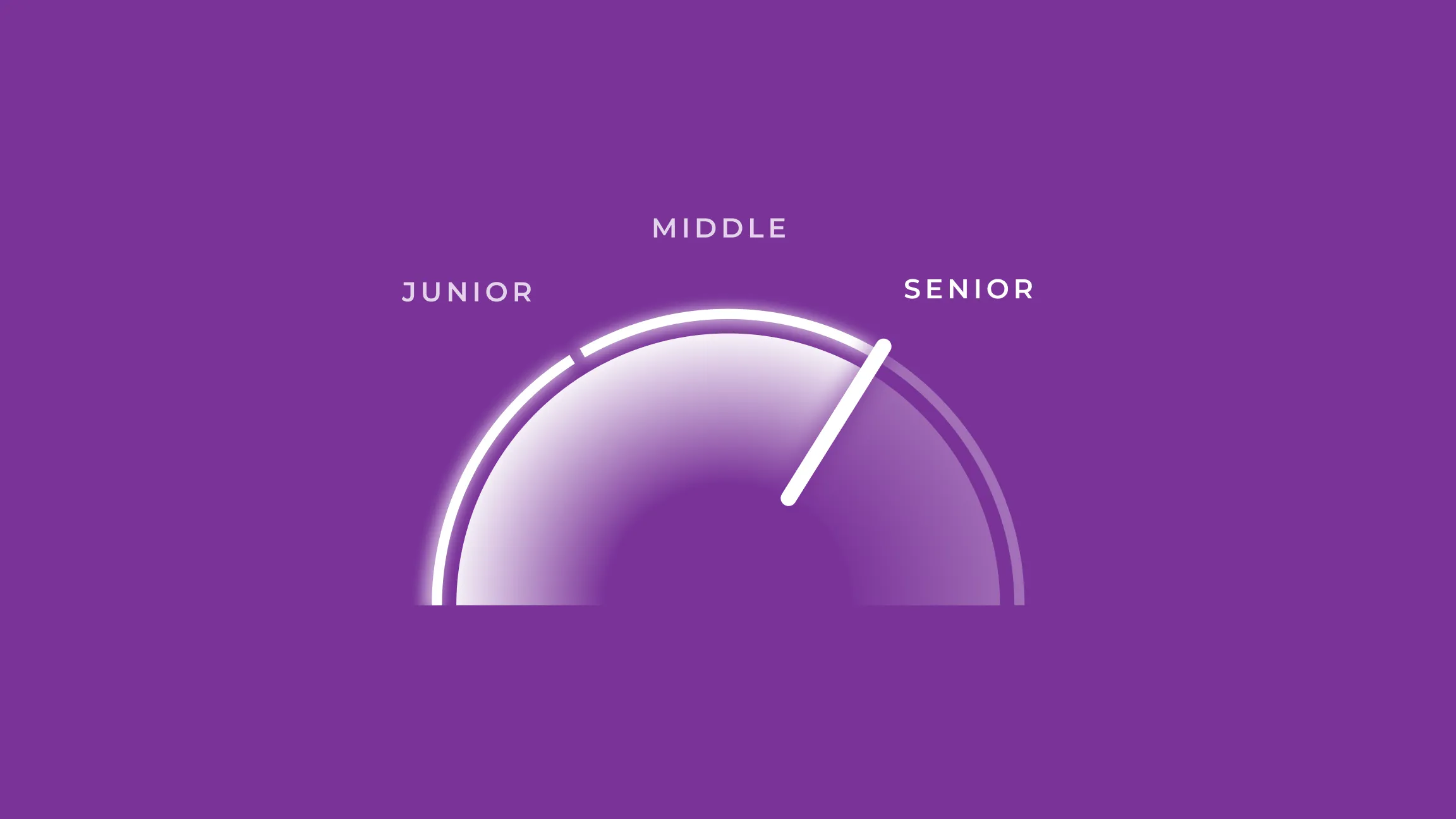От Джуна до Сеньора: у разработчика нет цели, только путь

В глазах htмелькает, в голове кряхтит «php-php», а на лице Жаба скрипит, но... Плох тот Джун, что не мечтает стать Сеньором.
Содержание:
Джун, Мидл и Сеньор — три уровня классификации разработчиков программного обеспечения, которые характеризуют опыт и степень навыков каждого. Существует шутка, что Джун должен знать все алгоритмы, Мидл – об их существовании, а Сеньор – за каким компьютером Джун. К реальности она относится мало, но дает понять, что каждый Джун мечтает стать Сеньором. Насколько сложен путь и чем он закончится в итоге, станет понятно при подробном разборе каждого класса.
Джун (Junior)

Молодой разработчик на начальном этапе карьеры. Только окончил университет или получил другое образование в области программирования. У него есть базовые знания и навыки, но не хватает практики. Джун требует руководства и наставничества старших разработчиков. Выполняет четко поставленные задачи в проекте и работает под присмотром Мидла или Сеньора. Не видит масштаб разработки и пока хочет «набить руку».
Hard skills Junior
Базовые знания программирования и таких языков, как PHP, Python, Java, C# или JavaScript.
Владение основными принципами алгоритмов и структур данных.
Применение концепций объектно-ориентированного программирования (OOP).
Использование таких инструментов разработки, как интегрированные среды разработки (IDE), системы контроля версий (Git) и отладчики.
Навыки веб-разработки, включая HTML, CSS и основы клиент-серверной архитектуры.
Понимание принципов и паттернов разработки ПО.
Способность читать и вносить мелкие правки в существующий код.
Мидл (Middle)

Мидл подкован для самостоятельной работы над проектами. Обладает глубоким пониманием программирования и разработки. Выполняет сложные задачи, участвует в архитектурных решениях и работает над различными модулями проекта. Он способен использовать свой опыт при возникновении трудностей и имеет определенные руководящие функции в отношении Джунов. Стремится к дальнейшему совершенствованию навыков и может подняться на следующий уровень – Сеньор.
Hard skills Middle
Углубленное знание выбранного языка программирования и его фреймворков.
Понимание сложных алгоритмических концепций и структур данных.
Опыт работы с базами данных и использование SQL для выполнения запросов и управления данными.
Владение инструментами и технологиями, специфичными для области, в которой работает.
Способность проектировать и строить средние по сложности приложения, понимая архитектурные принципы.
Умение работать в команде, выполнять задачи и взаимодействовать с другими разработчиками и заинтересованными сторонами проекта.
Сеньор (Senior)

Это высококвалифицированный и опытный разработчик с глубокими знаниями и навыками в выбранной области. Сеньор имеет большой опыт и успешно реализованные проекты за плечами. Способен руководить и координировать команду разработчиков, принимать стратегические решения и участвовать в архитектурных обсуждениях. Отвечает за создание дизайна системы, определение ключевых компонентов и решения по выбору технологий. Он гуру как для Джунов, так и для Мидлов.
Hard skills Senior
Глубокое знание выбранного языка программирования и экспертное владение его фреймворками.
Навыки работы с передовыми алгоритмическими концепциями, оптимизацией производительности и сложными структурами данных.
Проектирование и разработка сложных и масштабируемых систем.
Владение принципами работы с базами данных и их типами, включая реляционные и NoSQL.
Умение оптимизировать код и процессы для производительности приложения.
Применение новых технологий и инструментов, связанных с конкретной областью разработки: облачные платформы, микросервисная архитектура, DevOps и автоматизация процессов.
Способность анализировать и устранять сложные проблемы, а также предлагать инновационные и эффективные решения.
Опыт наставничества молодых разработчиков, делегирование задач и сотрудничество с другими членами команды для достижения общих целей проекта.
Сколько времени надо Джуну, чтобы стать Сеньором
Временной период становления разработчика сильно варьируется и зависит от нескольких факторов:
интенсивность и качество обучения,
опыт работы,
индивидуальные способности и усилия.
Чем больше времени и энергии Джун готов вложить в обучение и развитие своих навыков, тем быстрее он будет прогрессировать. Это включает и самостоятельное изучение новых концепций, и участие в проектах, и наставничество со стороны опытных разработчиков, а также дополнительное профессиональное образование.
Некоторым людям требуется больше времени, чтобы достичь уровня Сеньора, чем другим. Ведь личные способности, техническая сообразительность и усидчивость тоже влияют на скорость становления. В среднем нужно 3-7 лет, чтобы Джун смог достичь уровня Сеньора. Хотя многим это не удается и за десять. Но главный подвох в том, что в разработке нельзя стоять на месте, поэтому обучение и развитие навыков продолжаются на протяжении всего пути программиста.
Похожие статьи
![]() Готовы применить идеи из статьи?
Готовы применить идеи из статьи?
Опишите вашу задачу — сделаем бесплатный экспресс-разбор и предложим 2–3 рабочих решения под ваш кейс.


